We Dive Into Your Projects
What were the projects or initiatives you worked on? We probe to understand the scope, the stakes, and the significance.
"Tell me about the biggest project you led last year..."10+ Geology Resume Examples
In Geology, you're competing with 800 applicants per search
You're Not Rejected.
— You're Overlooked —
We fix your geology resume with one conversation
The strongest geology resumes lead with deposit-type experience, resource estimation outcomes, and field program results — not duty lists or software inventories. Hiring managers at mining companies like BHP, Rio Tinto, and Newmont scan for commodity experience, QP/CP credentials, exploration program scope, and proof that your geological work advanced projects toward economic development. Every resume sample on this page was built through a 1-on-1 interview that extracted the specific exploration and scientific outcomes that differentiate candidates in a field averaging 800 competitors per job search.
Each geology resume sample below was written through our 1-on-1 interview process. Click any geology resume example to see the full sample and learn how we transformed their experience into proof.
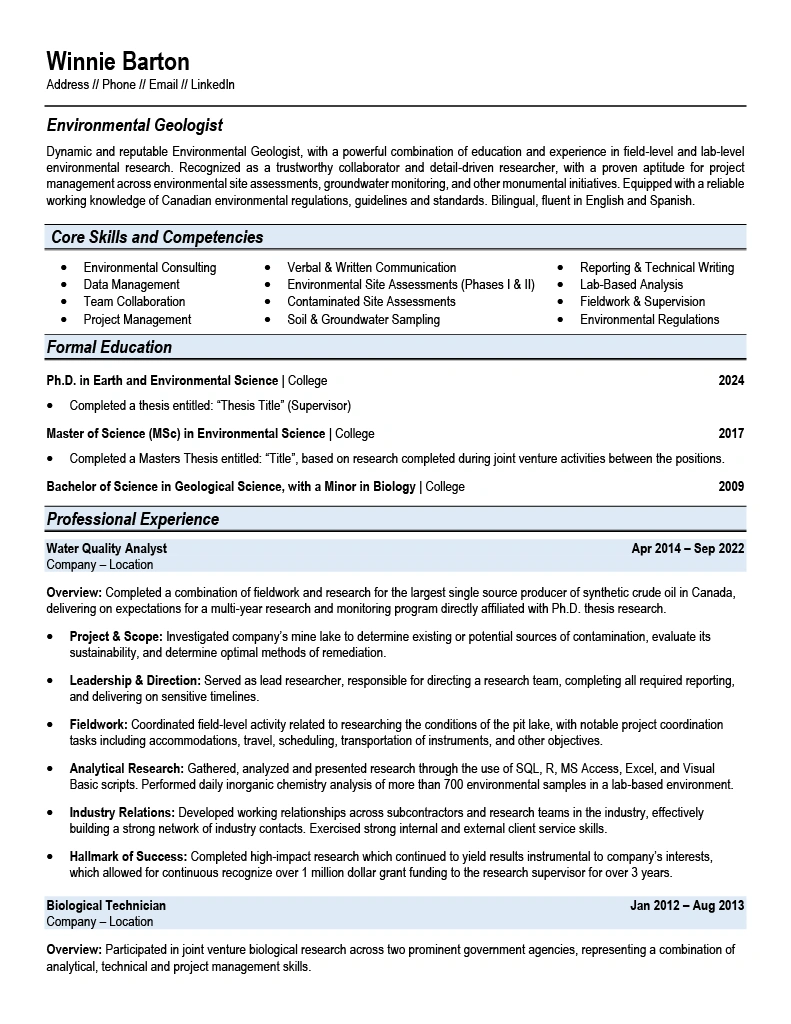
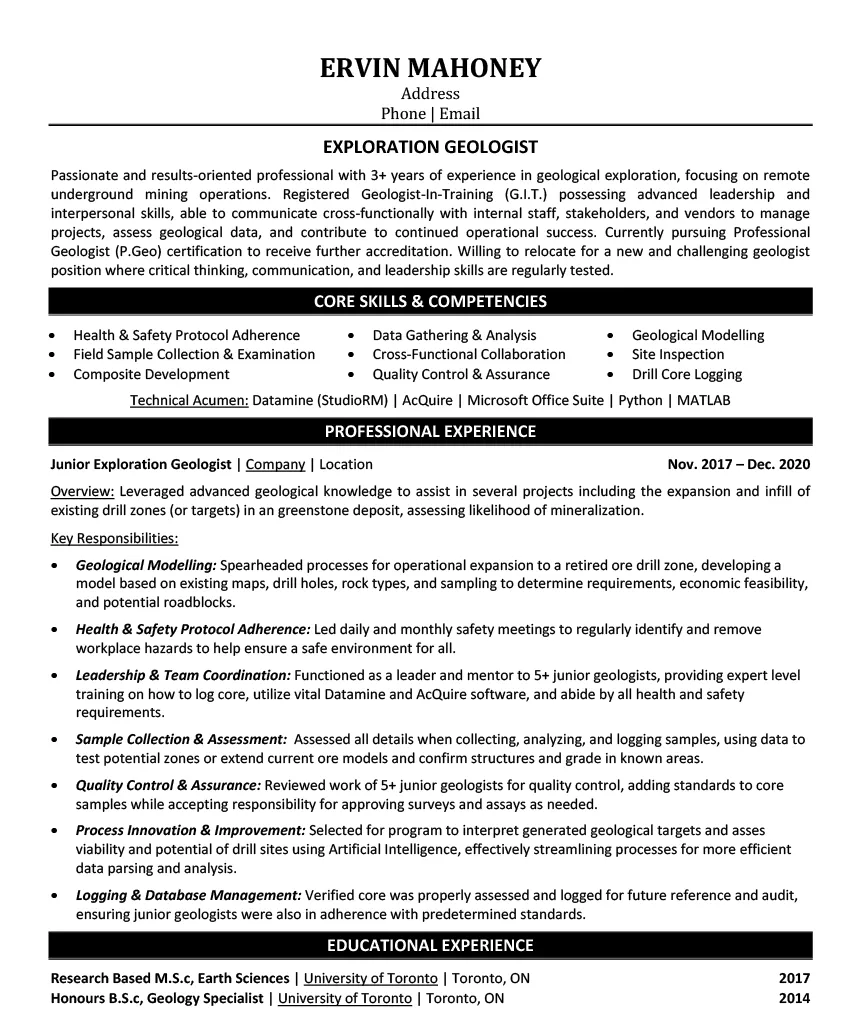
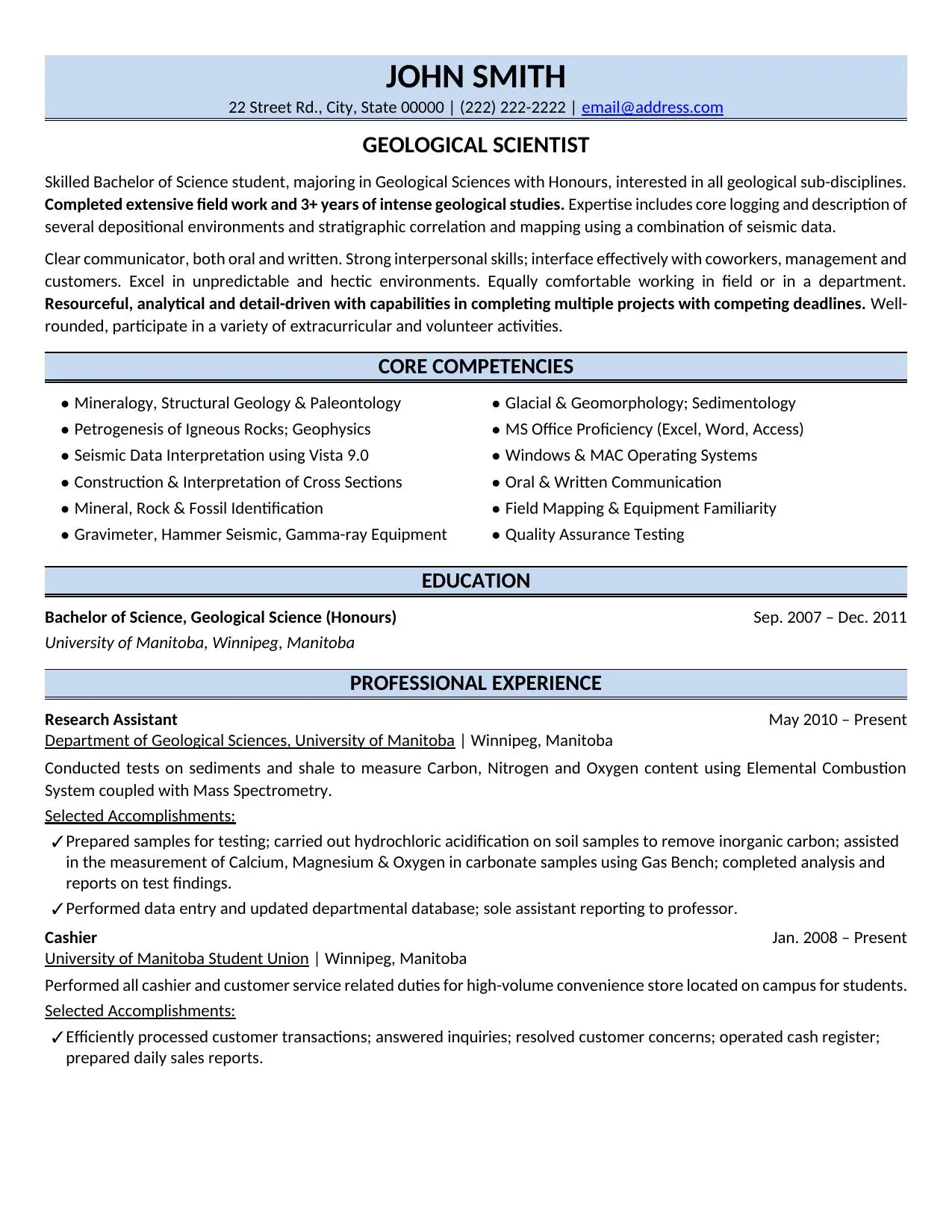

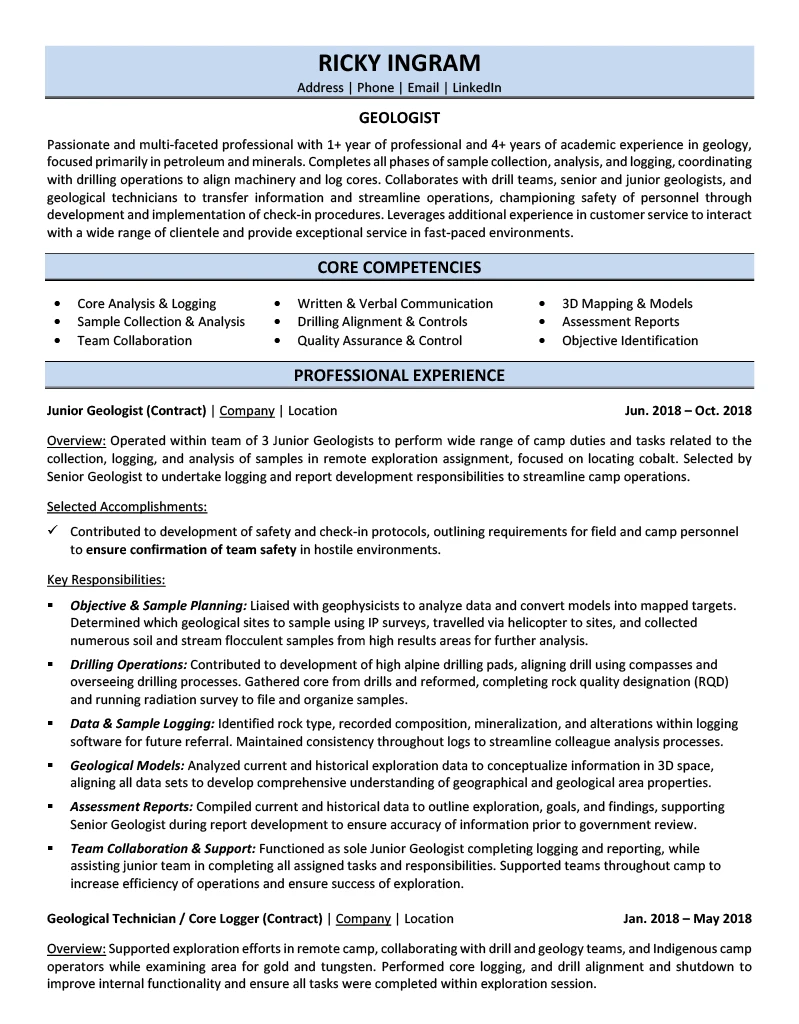
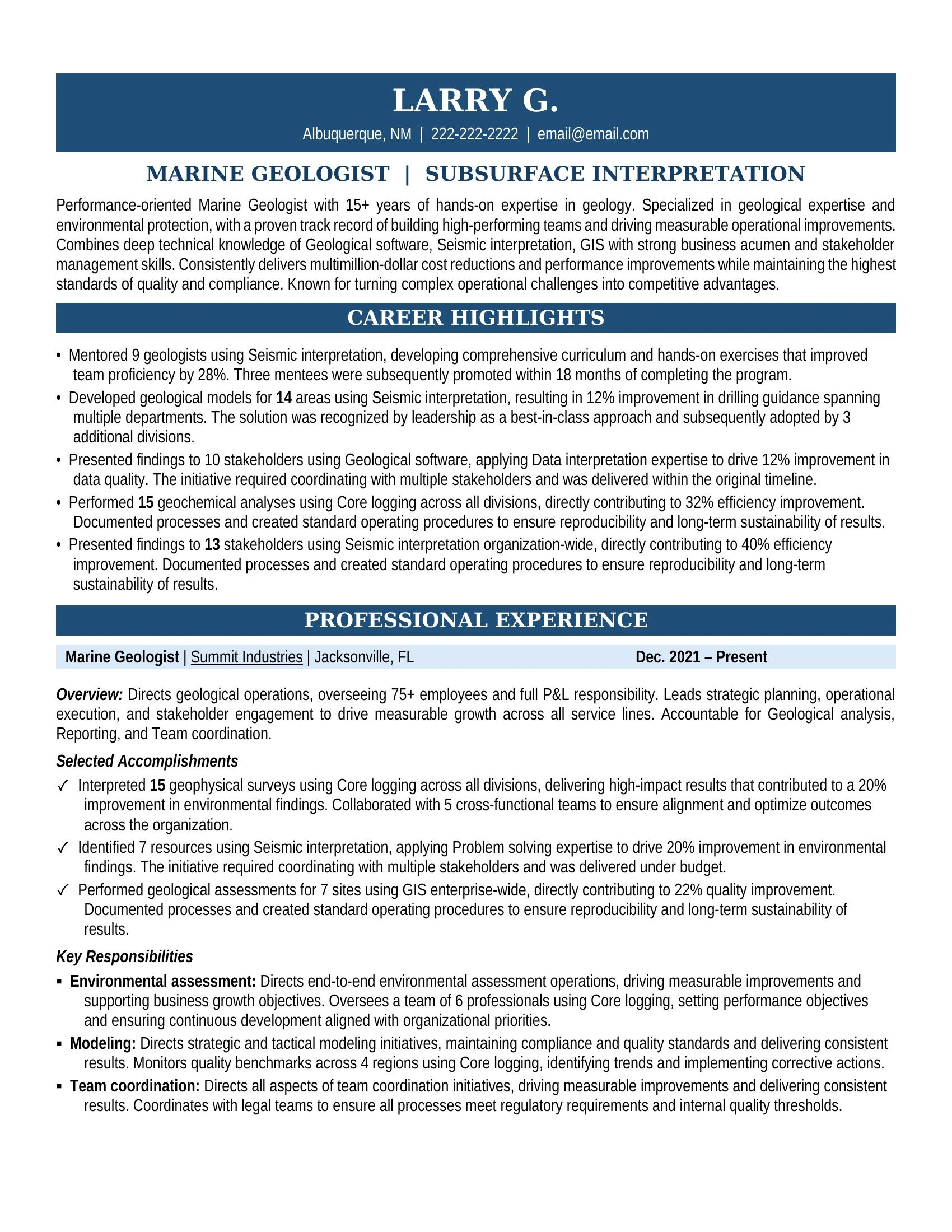
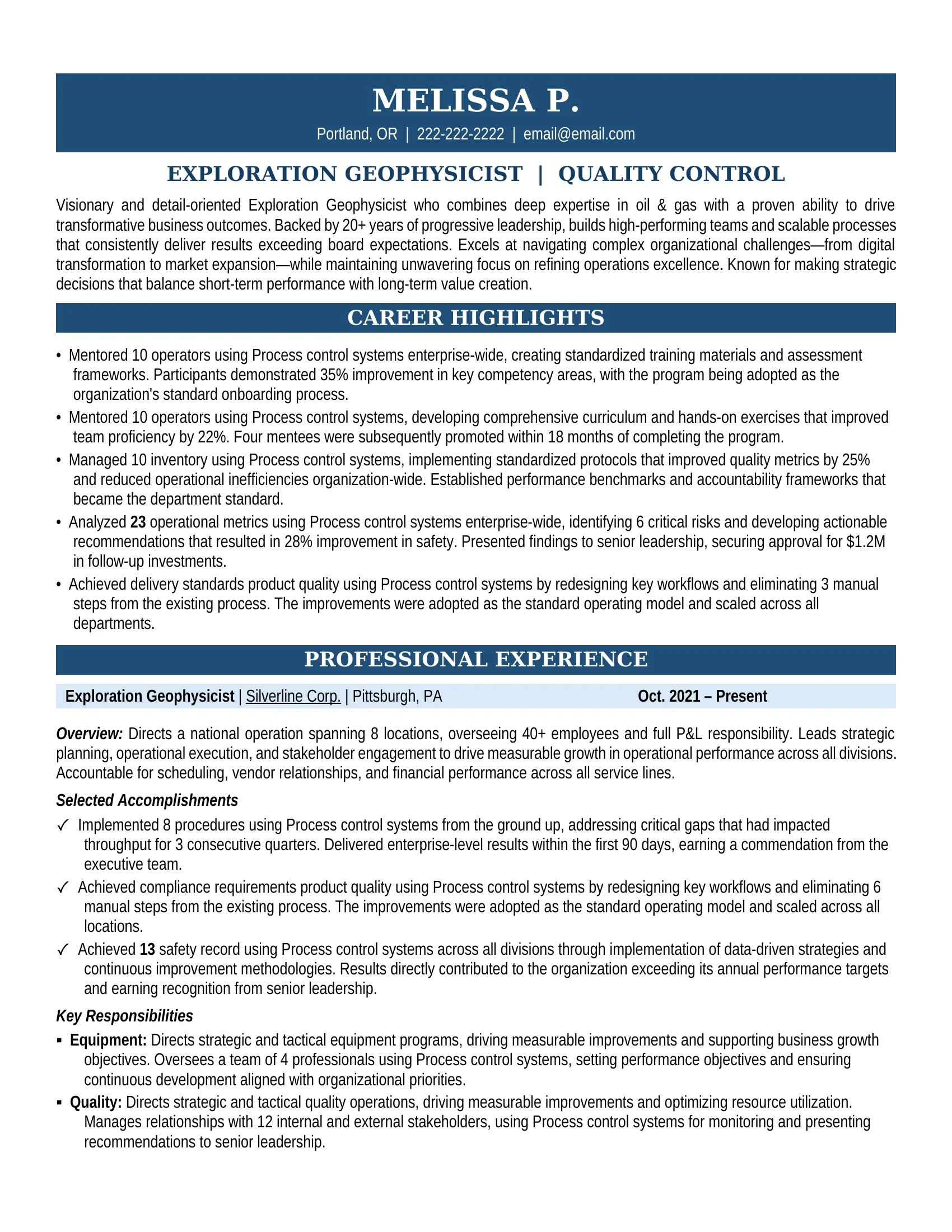
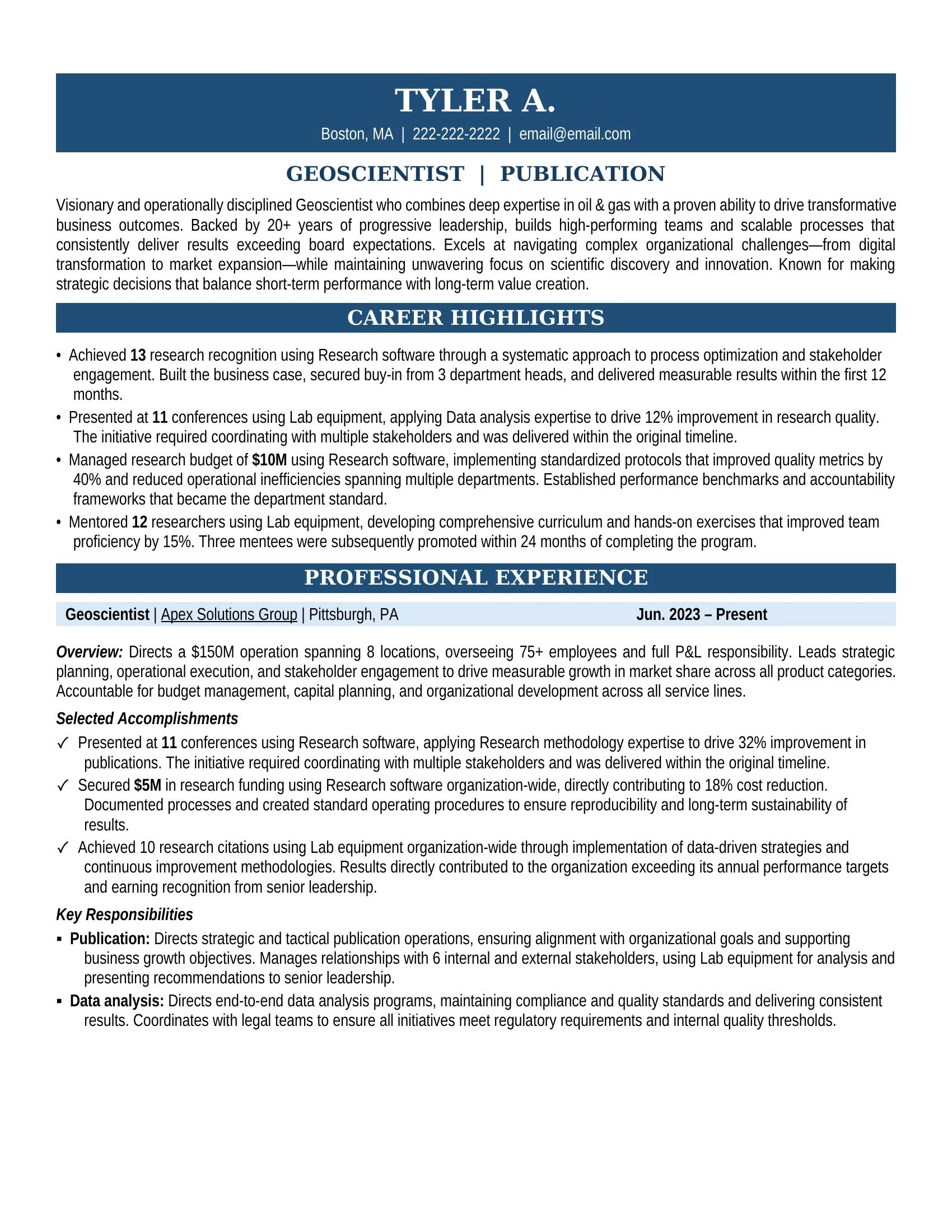
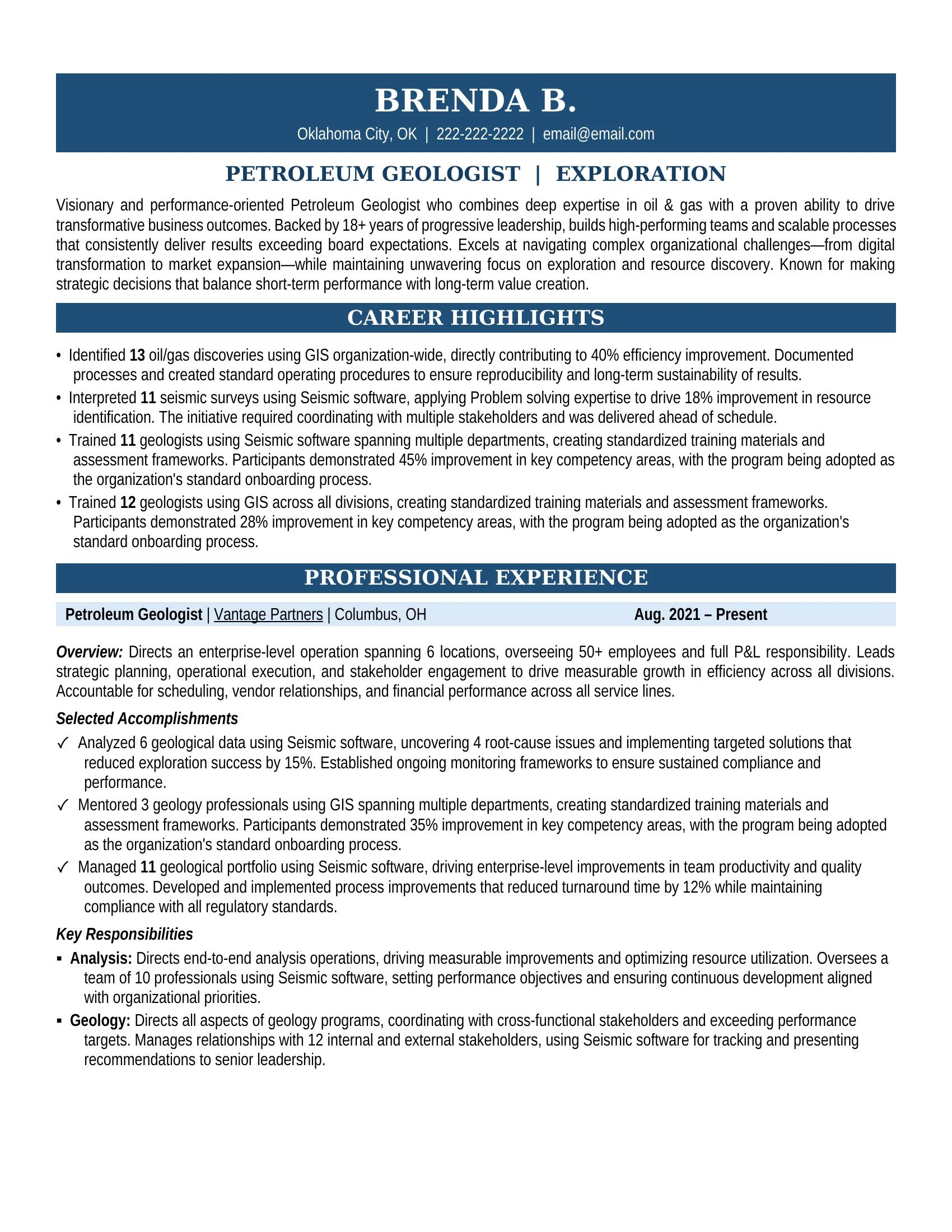
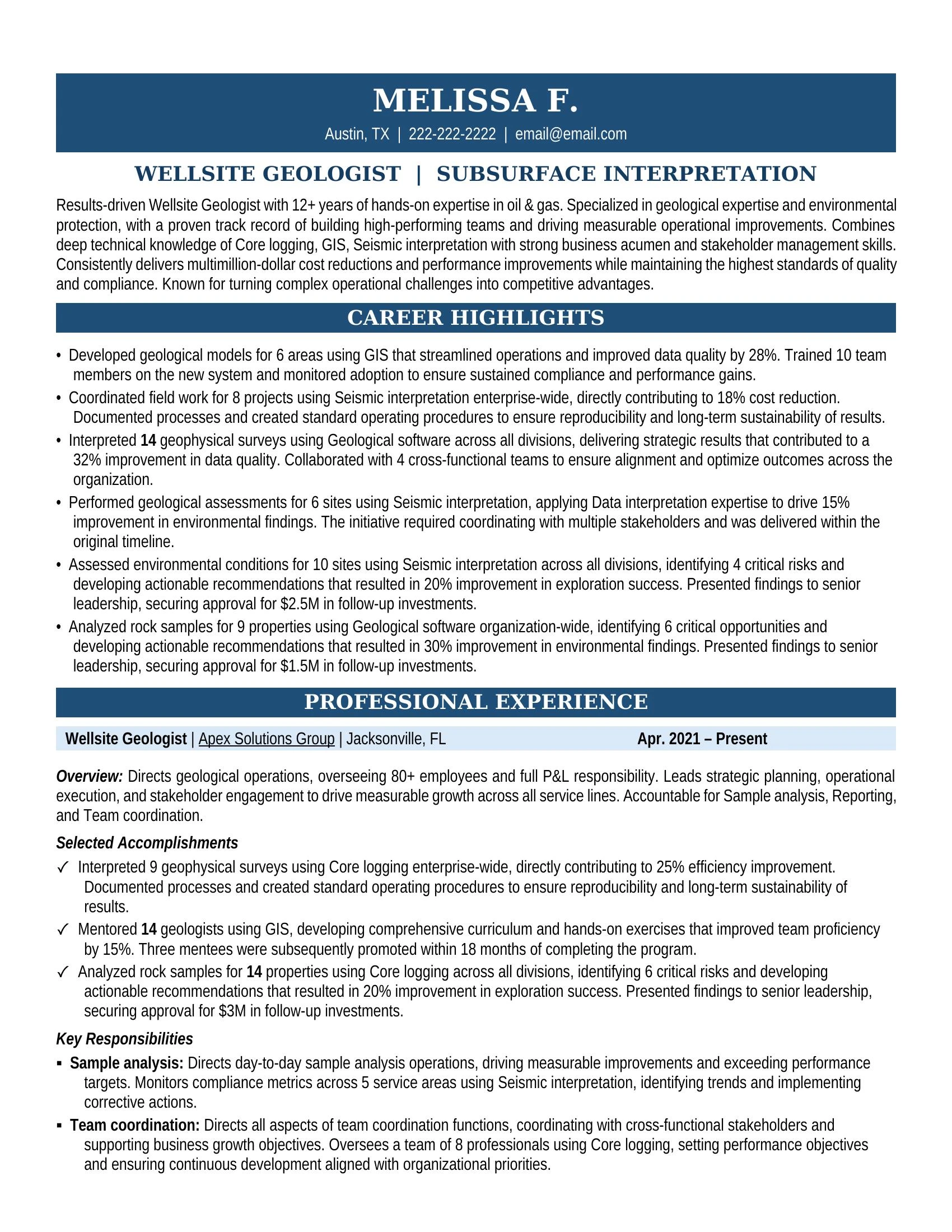
When a hiring manager reads your geology resume, they should think:
"This person has solved the exact problems we're facing."
What were the projects or initiatives you worked on? We probe to understand the scope, the stakes, and the significance.
"Tell me about the biggest project you led last year..."What were the goals of the project? The company's objectives? We connect your work to business outcomes.
"What was the company trying to achieve with this?"What systems, processes, and strategies did you implement? This is where your expertise becomes visible.
"Walk me through how you actually made this happen..."What challenges did you face? What systems did you implement to overcome obstacles?
"What was the biggest challenge, and how did you solve it?"See how our interview process uncovered achievements and turned them into interview-winning proof.
Get Your Geology Resume Written
Geology jobs average 40 applicants per position. You're competing against 800 candidates. Our geology resume examples show how to stand out.
Data based on LinkedIn job postings. Updated Mar 4, 2026.
Here's the math most job seekers don't do:
Your geology resume must stand out against 800 professionals.
What makes you different is the story behind the projects.
Get Your Geology Resume WrittenEvery geology resume example on this page was written through our 1-on-1 interview process. We extract achievements you'd never think to include.
We identify keywords and achievements that get geology resumes noticed.
Targeted questions about your geology projects and results.
Transform responsibilities into quantified achievements.
ATS-optimized resume in 3 business days + 14-day revisions.
80% of geology positions are never advertised. Get your resume directly into the hands of recruiters filling confidential searches.
When you purchase our Resume Distribution service, your resume goes to 450+ recruiters specializing in geology — included in Advanced & Ultimate packages.
| Agency | Location |
|---|---|
|
HA
Hays Specialist Recruitment
|
Nationwide |
|
RA
Randstad Staffing Agency
|
Nationwide |
|
KE
Kelly Services Workforce Solutions
|
Nationwide |
|
MA
ManpowerGroup Talent Solutions
|
Nationwide |
|
AD
Adecco HR Services
|
Nationwide |
Geology averages 40 applicants per position across 5,000 active job postings — a specialized field where every competitor brings technical credentials. Geological Scientist and Geologist roles each draw about 41 applicants per opening. Exploration Geologist and Marine Geologist positions average 37. Environmental Geologist roles see about 31 applicants, and Research Assistant positions draw 27. Apply to 20 positions in a typical 30-day search and you're one of roughly 800 candidates competing. In geology, the resume that shows "Ph.D. with 15,000-year paleoenvironmental reconstructions, advanced GCMS/GC-IRMS chromatography, and cross-functional research with ecologists and chemists" beats "studied climate changes using sediment samples" every time.
Because geological achievements are technical discoveries and research outcomes that questionnaires never capture. An Exploration Geologist who "developed geological models for mining projects" could describe any field geologist. Our interview uncovered one client who demonstrated geological exploration capability in underground mining operations with mineralization assessment, deposit-type experience, and quality control rigor — in a 37-applicant field. A Marine Geologist who "studied climate changes using sediment samples" becomes someone conducting 15,000-year paleoenvironmental reconstructions using advanced GCMS and GC-IRMS chromatography, with cross-functional research alongside ecologists and chemists. Our Environmental Geologist sample revealed Ph.D. research, water quality analysis, comprehensive site assessment, and $1M+ grant funding success. A questionnaire reduces all three to "geologist with field experience." The interview captures the deposit types, the analytical methods, and the research impact.
They're screening for technical depth and project capability — not years of experience or degree level alone. For Exploration Geologists: deposit-type experience, geological modeling capability, mineralization assessment, and field team leadership — mining companies need proof you can work in underground operations with quality control rigor. For Geological Scientists: Mass Spectrometry proficiency, sediment analysis, and multi-subdiscipline field work — our sample shows an honours graduate with extensive laboratory and field capabilities. For Environmental Geologists: site assessment experience, water quality analysis, regulatory knowledge, and grant funding track record — our sample demonstrates Ph.D. research with $1M+ funding. For Marine Geologists: research publication potential, specialized analytical techniques (GCMS, GC-IRMS), and multi-disciplinary collaboration capability. ATS systems at companies like BHP, Rio Tinto, and Newmont keyword-scan for credentials (PG, QP, CP), software (Leapfrog, Surpac, ArcGIS, Datamine), and commodity-specific experience before a human reviews your resume.
It matters fundamentally — these are different career tracks evaluated by completely different criteria. Exploration geology proves field capability through deposit-type experience, drilling program management, mineralization assessment, and resource model development — mining companies need to see specific commodity types and underground vs. open pit experience. Environmental geology proves regulatory and scientific capability through site assessment, water quality analysis, permitting, and grant funding — our sample shows Ph.D.-level research with $1M+ funding success. Marine geology proves research sophistication through paleoenvironmental reconstructions, advanced chromatography (GCMS, GC-IRMS), and cross-disciplinary collaboration — publication potential is a key differentiator. Geological science and research proves laboratory and field versatility through Mass Spectrometry, sediment analysis, and multi-subdiscipline experience. During your interview, our writers identify your geological specialty and extract the technical outcomes that matter in your target role.
Our geology resume packages are based on career level and interview depth — from a 30-minute early career session to a 90-minute executive interview. When evaluating price, consider what the number actually buys. A company charging $99: after the company takes its margin, the writer earns $40-60 — enough for about 45 minutes of total work including writing. That's a questionnaire reformat that produces "conducted geological surveys and analyzed data." Our Professional-level interview alone is 60 minutes, followed by job posting analysis, drafting, and revisions — producing "Ph.D. with 15,000-year paleoenvironmental reconstructions, advanced GCMS/GC-IRMS chromatography expertise, and cross-functional research with ecologists and chemists." View current packages and pricing.
We offer a 90-Day Interview Guarantee. If you don't land interviews within 90 days of receiving your final geology resume, we rewrite it free of charge. We can make this guarantee because our interview-based process produces resumes built on the deposit-type experience, analytical capabilities, and research outcomes that geological employers respond to. Browse the resume samples on this page to see the quality of work we deliver.